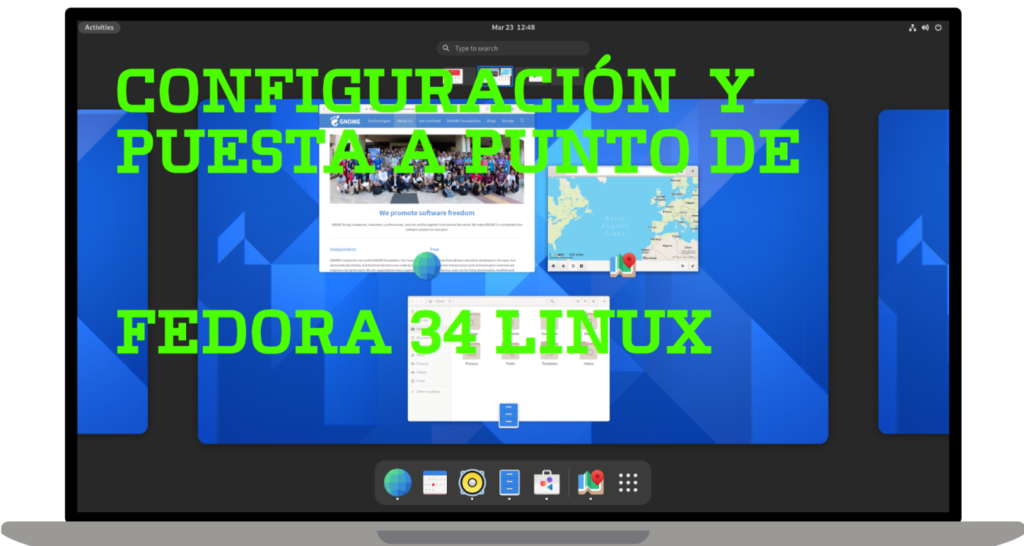Mozilla Firefox It is a free and open-source web browser developed for various platforms, coordinated by the Mozilla Corporation and the Mozilla Foundation. It uses the Gecko engine to render web pages, which implements current and future web standards.
Firefox is the fast, lightweight, privacy-focused browser that works across all your devices.
No shady privacy policies or backdoors for advertisers. Just a super-fast browser that doesn't sell you anything.
Many Linux distributions come with Firefox preinstalled via their package manager and set as the default browser. However, if you need to install Firefox on Linux using a different method, the following guide will show you several alternative ways to download and install Firefox on Linux.
Install from your distribution's package manager (Recommended)
To install Firefox using the package manager, please refer to the documentation for the Linux distribution you are using.
This method is recommended because it ensures that Firefox and all necessary libraries are installed and optimally configured for your distribution. However, there may be a slight delay between the official release of a new version of Firefox and the time your distribution updates the version it distributes. Your distribution may also distribute it without the Firefox branding, or only distribute the version. ESR.
// versión ESR
$ sudo apt install firefox-esr firefox-esr-l10n-es-es
// The Firefox web browser
$ sudo apt install firefox firefox-l10n-xpi-es-es
Install from Flatpak
To install Firefox from Flatpak, install and configure Flatpak on your computer. Once Flatpak is installed, go to the Firefox page on Flathub and click on the Install buttonYou can also type the following command in a terminal:
$ flatpak install flathub org.mozilla.firefox
By default, Flatpak installs Firefox in the same locale as your operating system.
Install from Snap
To install Firefox from Snap, install Snap on your computer. Once Snap is installed, go to the Firefox page in Snapcraft, click the Install button and follow the instructions. You can also type the following command in a terminal:
$ sudo snap install firefox
If available, Snap installs Firefox in the same locale as your operating system.
Install the Firefox .deb package for Debian-based distributions
To install the .deb package through the APT repository, do the following:
- Create a directory to store the APT repository keys if it doesn't exist:
$ sudo install -d -m 0755 /etc/apt/keyrings
- Import the signing key from the Mozilla APT repository:
$ wget -q https://packages.mozilla.org/apt/repo-signing-key.gpg -O- | sudo tee /etc/apt/keyrings/packages.mozilla.org.asc > /dev/null
If you don't have wget installed, you can install it with:
$ sudo apt-get install wget
- The fingerprint must be 35BAA0B33E9EB396F59CA838C0BA5CE6DC6315A3:
$ gpg -n -q --import --import-options import-show /etc/apt/keyrings/packages.mozilla.org.asc | awk '/pub/{getline; gsub(/^ +| +$/,""); print "\n"$0"\n"}'
- Next, add the Mozilla APT repository to your sources list:
$ echo "deb [signed-by=/etc/apt/keyrings/packages.mozilla.org.asc] https://packages.mozilla.org/apt mozilla main" | sudo tee -a /etc/apt/sources.list.d/mozilla.list > /dev/null
- Configure APT to prioritize packages from the Mozilla repository:
$ echo '
Package: *
Pin: origin packages.mozilla.org
Pin-Priority: 1000
' | sudo tee /etc/apt/preferences.d/mozilla
- Update your package list and install the Firefox .deb package:
$ sudo apt-get update
$ sudo apt-get install firefox
Configure different languages in Firefox with .deb files
For those who wish to use Firefox in a language other than American English, we've also created .deb packages containing Firefox language packs. To install a specific language pack, replace "is» in the following example by the code of the desired language:
$ sudo apt-get install firefox-l10n-es-es
To list all available language packs, you can use this command after adding the Mozilla APT repository and running:
$ sudo apt-get update
$ apt-cache search firefox-l10n
Install Firefox with Mozilla source code file
Before installing Firefox with a Mozilla archive, make sure your computer has the required libraries installed. Missing or incompatible libraries will prevent Firefox from running.
Software Requirements
Please note that GNU/Linux distributors may provide packages for their distribution that have different requirements.
Firefox will not run without the following libraries or packages:
glibc 2.17 or higher
gtk+ 3.14 or higher
libglib 2.42 or higher
libstdc++ 4.8.1 or higher
xorg 1.0 or higher (1.7 or higher recommended)
$ sudo apt install libc6 libgtk-3-0 libglib2.0-0 libstdc++5 xorg
For optimal functionality, we recommend the following libraries or packages:
dbus 1.0 or higher
network-manager 0.7 or higher
pulseaudio
$ sudo apt install dbus network-manager pulseaudio
Installing Firefox at the system level (for advanced users)
To install Firefox using this method, you must be able to log in as root or execute commands I sweat.
This installation will take priority over the version of Firefox installed through your package manager. To run the version installed through your package manager, you'll need to run the binary from a terminal. To do this, on most distributions, open a terminal and type:
/usr/bin/firefox
- Go to the Firefox download page and click the Download Now button.
- Open a terminal and go to the folder where your download was saved.
$ cd Descargas
- Extract the contents of the downloaded file by typing:
$ tar xjf firefox-*.tar.bz2
We list to see the firefox folder
$ ls
firefox firefox-125.0.1.tar.bz2
The following commands must be run as root, or preceded by sudo.
- Move the unzipped Firefox folder to /opt:
$ sudo mv firefox /opt
We list to see the firefox folder in /opt:
$ ls /opt
firefox
- Create a symbolic link to the Firefox executable:
$ sudo ln -s /opt/firefox/firefox /usr/local/bin/firefox
- Download a copy of the desktop file:
$ sudo wget https://raw.githubusercontent.com/mozilla/sumo-kb/main/install-firefox-linux/firefox.desktop -P /usr/local/share/applications
Alternatively, if wget is not installed on your computer, go to the URL mentioned above, right-click on the page to open the context menu and select Save Page As. Once the file is downloaded, move it to /usr/local/share/applications.

[Desktop Entry]
Version=1.0
Name=Firefox Web Browser
Comment=Browse the World Wide Web
GenericName=Web Browser
Keywords=Internet;WWW;Browser;Web;Explorer
Exec=firefox %u
Terminal=false
X-MultipleArgs=false
Type=Application
Icon=/opt/firefox/browser/chrome/icons/default/default128.png
Categories=GNOME;GTK;Network;WebBrowser;
MimeType=text/html;text/xml;application/xhtml+xml;application/xml;application/rss+xml;application/rdf+xml;image/gif;image/jpeg;image/png;x-scheme-handler/http;x-scheme-handler/https;x-scheme-handler/ftp;x-scheme-handler/chrome;video/webm;application/x-xpinstall;
StartupNotify=true
// Mover archivo firefox.desktop a /usr/local/share/applications
$ sudo mv firefox.desktop /usr/local/share/applications
To check that the installation was successful, you can open the application, the Application Binary value should be /opt/firefox/firefox-bin.
$ /opt/firefox/firefox-bin

Thanks to this process, we have the official Firefox version in our language in the latest stable version. If it's been helpful, please support me, and if you have any questions, don't hesitate to ask.
Official source: https://support.mozilla.org/es/kb/Instalar-firefox-linux

